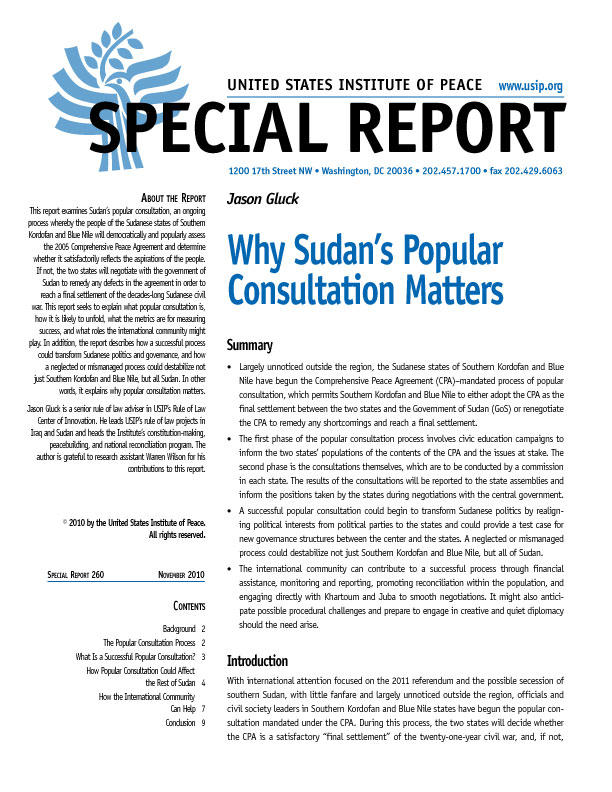Why Sudan’s Popular Consultation Matters
This report examines Sudan’s popular consultation, an ongoing process whereby the people of the Sudanese states of Southern Kordofan and Blue Nile will democratically and popularly assess the 2005 Comprehensive Peace Agreement and determine whether it satisfactorily reflects the aspirations of the people.

Summary
- Largely unnoticed outside the region, the Sudanese states of Southern Kordofan and Blue Nile have begun the Comprehensive Peace Agreement (CPA)–mandated process of popular consultation, which permits Southern Kordofan and Blue Nile to either adopt the CPA as the final settlement between the two states and the Government of Sudan (GoS) or renegotiate the CPA to remedy any shortcomings and reach a final settlement.
- The first phase of the popular consultation process involves civic education campaigns to inform the two states’ populations of the contents of the CPA and the issues at stake. The second phase is the consultations themselves, which are to be conducted by a commission in each state. The results of the consultations will be reported to the state assemblies and inform the positions taken by the states during negotiations with the central government.
- A successful popular consultation could begin to transform Sudanese politics by realigning political interests from political parties to the states and could provide a test case for new governance structures between the center and the states. A neglected or mismanaged process could destabilize not just Southern Kordofan and Blue Nile, but all of Sudan.
- The international community can contribute to a successful process through financial assistance, monitoring and reporting, promoting reconciliation within the population, and engaging directly with Khartoum and Juba to smooth negotiations. It might also anticipate possible procedural challenges and prepare to engage in creative and quiet diplomacy should the need arise.
About this Report
This report examines Sudan’s popular consultation, an ongoing process whereby the people of the Sudanese states of Southern Kordofan and Blue Nile will democratically and popularly assess the 2005 Comprehensive Peace Agreement and determine whether it satisfactorily reflects the aspirations of the people. If not, the two states will negotiate with the government of Sudan to remedy any defects in the agreement in order to reach a final settlement of the decades-long Sudanese civil war. This report seeks to explain what popular consultation is, how it is likely to unfold, what the metrics are for measuring success, and what roles the international community might play. In addition, the report describes how a successful process could transform Sudanese politics and governance, and how a neglected or mismanaged process could destabilize not just Southern Kordofan and Blue Nile, but all Sudan. In other words, it explains why popular consultation matters.
Jason Gluck is a senior rule of law adviser in USIP’s Rule of Law Center of Innovation. He leads USIP’s rule of law projects in Iraq and Sudan and heads the Institute’s constitution-making, peacebuilding, and national reconciliation program. The author is grateful to research assistant Warren Wilson for his contributions to this report.



